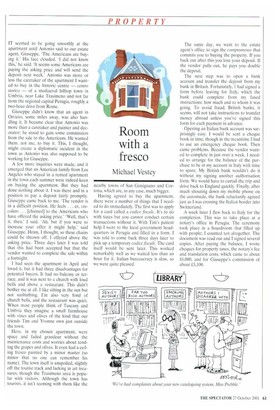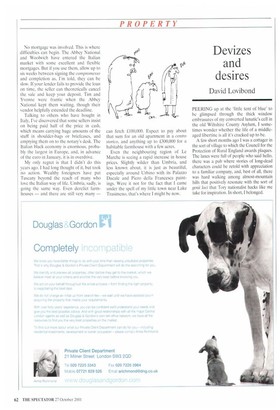Room with a fresco
Michael Vestey
IT seemed to be going smoothly at the apartment until Antonio said to our estate agent, Giuseppe. 'The Americans are buying it.' His face clouded. 'I did not know this,' he said. 'It seems some Americans are paying the asking price and will send the deposit next week.' Antonio was more or less the caretaker of the apartment I wanted to buy in the historic centre ŌĆö centro storico ŌĆö of a mediaeval hilltop town in Umbria, near Lake Trasimeno and not far from the regional capital Perugia, roughly a two-hour drive from Rome.
Giuseppe didn't know that an agent in Orvieto, some miles away, was also handling it. It became clear that Antonio was more than a caretaker and painter and decorator; he stood to gain some commission from the sale to the Americans. He wanted them, not me, to buy it. This, I thought, might create a diplomatic incident in the town as Antonio was also supposed to be working for Giuseppe.
A few more inquiries were made, and it emerged that an American family from Los Angeles who stayed in a rented apartment in the town each summer were indeed keen on buying the apartment. But they had done nothing about it. I was there and in a position to pay a deposit fairly promptly. Giuseppe came back to me. 'The vendor is in a difficult position. He feels . . . er, vincolato . . . [chained] to the Americans who have offered the asking price."Well, that's it, then,' I said. `Ah. but if you were to increase your offer it might help,' said Giuseppe. Hmm, I thought, so these chains could be thrown off. I offered above the asking price. Three days later I was told that this had been accepted but that the vendor wanted to complete the sale within a fortnight.
I had seen the apartment in April and loved it, but it had three disadvantages for potential buyers. It had no balcony or terrace, and it was next to a church with loud bells and above a restaurant. This didn't bother me at all. I like sitting in the sun but not sunbathing. I'm also very fond of church bells, and the restaurant was quiet. When most people think of Tuscany and Umbria they imagine a small farmhouse with vines and olives of the kind that our friends Tim and Yvonne own just outside the town.
Here, in my chosen apartment, were space and faded grandeur without the maintenance costs and worries about tending the grapes and olives. It even had a ceiling fresco painted by a minor master (so minor that no one can remember his name). The town itself is unspoiled, slightly off the tourist track and lacking in art treasures. though the Trasimeno area is popular with visitors. Although the town has tourists, it isn't teeming with them like the
nearby towns of San Gimignano and Cortona, which are, in any case, much bigger.
Having agreed to buy the apartment, there were a number of things that I needed to do immediately. The first was to apply for a card called a codice fiscale. It's to do with taxes but you cannot conduct certain transactions without it. With Tim's patient help I went to the local government headquarters in Perugia and filled in a form. I was told to come back three days later to pick up a temporary codice fiscale. The card itself would be sent later. This worked remarkably well as we waited less than an hour for it. Italian bureaucracy is slow, so we were quite pleased.
The same day, we went to the estate agent's office to sign the compromesso that commits you to buying the property. If you back out after this you lose your deposit. If the vendor pulls out, he pays you double the deposit.
The next step was to open a bank account and transfer the deposit from my bank in Britain. Fortunately, I had signed a form before leaving for Italy, which the bank could complete from my faxed instructions: how much and to whom it was going. To avoid fraud. British banks, it seems, will not take instructions to transfer money abroad unless you've signed this form for each payment in advance.
Opening an Italian bank account was surprisingly easy. I would be sent a cheque book in time, though in the meantime I had to use an emergency cheque book. Then came problems. Because the vendor wanted to complete in just over a week, I needed to arrange for the balance of the purchase to be in my account in Italy with time to spare. My British bank wouldn't do it without my signing another authorisation form. We would have to curtail the trip and drive back to England quickly. Finally, after much shouting down my mobile phone on the autostrada, the bank reluctantly agreed just as I was crossing the Italian border into Switzerland.
A week later I flew back to Italy for the completion. This was to take place at a notary's office in Perugia. The ceremony took place in a boardroom that filled up with people; I counted ten altogether. The document was read out and I signed several copies. After paying the balance, I wrote cheques for property taxes, the notary's fee and translation costs, which came to about ┬Ż6,000, and for Giuseppe's commission of about ┬Ż3,100. No mortgage was involved. This is where difficulties can begin. The Abbey National and Woolwich have entered the Italian market with some excellent and flexible mortgages. But if you use them, allow up to six weeks between signing the compromesso and completion as, I'm told, they can be slow. If your lender fails to provide the loan on time, the seller can theoretically cancel the sale and keep your deposit. Tim and Yvonne were frantic when the Abbey National kept them waiting, though their vendor helpfully extended the deadline.
Talking to others who have bought in Italy, I've discovered that some sellers insist on being paid half of the price in cash, which means carrying huge amounts of the stuff in shoulder-bags or briefcases, and emptying them on to the notary's desk. The Italian black economy is enormous, probably the largest in Europe, and, in advance of the euro in January, it is in overdrive.
My only regret is that I didn't do this years ago. I had long thought of it, but took no action. Wealthy foreigners have put Tuscany beyond the reach of many who love the Italian way of life. Umbria, sadly, is going the same way. Even derelict farmhouses ŌĆö and there are still very many ŌĆö can fetch ┬Ż100,000. Expect to pay about that sum for an old apartment in a centro storico, and anything up to ┬Ż300,000 for a habitable farmhouse with a few acres.
Even the neighbouring region of Le Marche is seeing a rapid increase in house prices. Slightly wilder than Umbria, and less known about, it is just as beautiful, especially around Urbino with its Palazzo Ducale and Piero della Francesca paintings. Were it not for the fact that I came under the spell of my little town near Lake Trasimeno, that's where [might be now.











































































 Previous page
Previous page